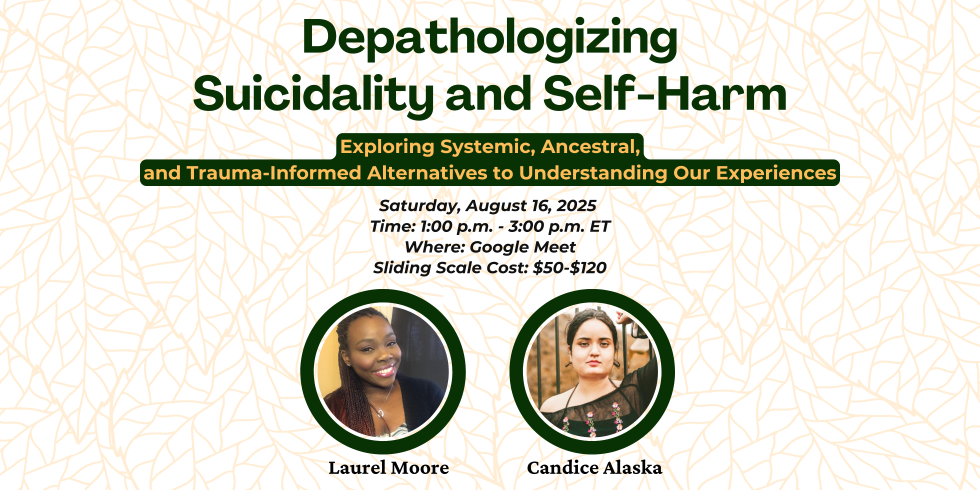About this event
Depathologizing Suicidality and Self-Harm — Exploring Systemic, Ancestral, and Trauma-Informed Alternatives to Understanding Our Experiences
Please note: If you're unable to afford the minimum sliding scale amount for admission to this workshop, you can apply for a scholarship using this link.
Facilitators: Candice Alaska & Laurel Moore
This 2-hour workshop will explore non-pathologizing approaches to making sense of suicidality and self-harm.
We will explore multiple ways of viewing suicidality and self-harm that don't view either as irrational, including as protective responses to violence and oppression, means of surviving dystopian conditions, and as forms of wisdom that can help guide us towards collective liberation.
Captions will be automatically generated. A recording with captions will be sent out afterwards to all who register. Even if you're unable to attend live, you will still be able to access the full recording.
Who is this workshop for?
This workshop is for everyone who wishes to unlearn harmful narratives about suicidality and self-harm.
It is intended for those who use these coping mechanisms, as well as for loved ones and mental health practitioners seeking to better understand, and offer more compassionate care to their clients.
How are self-harm and suicidality pathologized?
The Mental Health Industrial Complex has influenced people to view suicidality and self-harm as maladaptive behaviors and signs of mental illness that must be stopped by any means necessary — including through medical violence.
People who self-harm are disparagingly considered attention-seeking and manipulative. Suicidal people are deemed "not in their right minds". From so-called safety contracts to forced hospitalization to ultimatums, pathologizing self-harm and suicidality enables so much violence.
What we want participants to gain from this workshop:
Understanding the dangers of seeing self-harm and suicidality as inherently harmful, morally wrong or always as a sign that someone is in crisis
Exploring why self-harm and suicidality are not "symptoms" of a "mental illness" or "personality disorder"
Honoring "self-harm" as a very wide spectrum of harm and motivations, and honoring suicidality’s function in aiding a person’s survival and potential evolution
Understanding the importance of approaching suicidal ideation as an adaptive response to sociopolitical and environmental issues, and as a survival aid
Understanding why honoring the bodily autonomy of people who self-harm is critical for collective liberation, especially Trans, youth and survivor liberation.
About the Facilitators
Candice Alaska is a Trinidadian writer, survivor advocate and domestic violence researcher with years of experience in supporting survivors, guided by the principles of Disability Justice and Harm Reduction. As an abuse and gun violence survivor, her experiences of enduring sanist attitudes for being victimised radicalised her against the pathology paradigm of 'mental illness' and to working towards Mad Liberation. She's the founder of NotOkayTT, which has created resources for neurodivergent people in Trinidad and Tobago. She now writes and creates spaces for survivors to unlearn internalised sanism, depathologise our survival strategies, and to unpack the significant role that the Mental Health Industrial Complex plays in the oppression of survivors.
Laurel is a Jamaica-born psychospiritual practitioner living in the United States, with lived experience of suicidality and psychiatric abuse. She operates her practice through SpectacuLaur Thoughts LLC. Holding a BSc in biology and psychology and having navigated various altered states, she integrates Jungian theory with Afro-Caribbean Indigenous, Earth-based wisdom to create educational content and facilitate workshops. Her work seeks to empower individuals pathologized by the Mental Health Industrial Complex and to educate mental health professionals on more effective, compassionate approaches. As a psychiatric survivor, she is committed to depathologizing mental health conditions in order to foster individual, societal, and environmental wellness.

